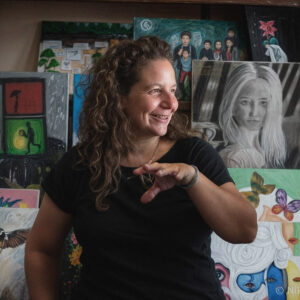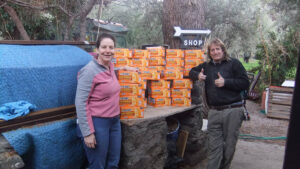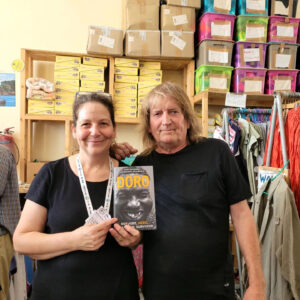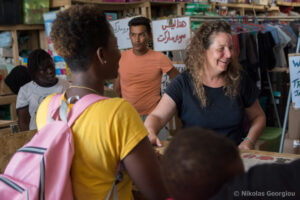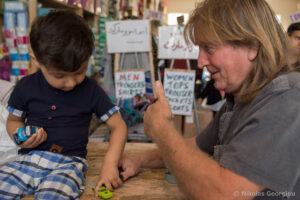Philippa Kempson
Credentials
Humanitarian Cause
Emergency Response, Rescue in Emergency Situations, Search and Rescue Operation, Forced Displacement, Supporting Refugees
Impact Location
Greece
Occupation
Activist / Refugee Activist
Photo Gallery
About
Philippa Kempson is a humanitarian activist known for her remarkable dedication to supporting refugees in Greece amidst one of the world’s most significant migration crises. As the co-founder of the Hope Project, a charitable organization she leads alongside her husband, Eric Kempson, Philippa has become a beacon of hope for thousands of refugees arriving on the Greek island of Lesvos. Over the years, she has transformed her home into a refuge and distribution center, where essentials such as food, clothing, and medical aid are provided to those in desperate need. Her story is one of resilience, compassion, and an unwavering commitment to alleviating human suffering, particularly among the world’s most vulnerable populations.
Born in 1971 in Wales, United Kingdom, Philippa’s journey into humanitarian work was not a straightforward one. Initially trained in social work, she spent time exploring various fields and locations. She lived in the United States for a period, working as a nanny, before returning to the UK and building a career in hospitality and retail management. This experience broadened her understanding of different cultures and further developed her people skills, which would prove invaluable in her future humanitarian efforts. In 2000, Philippa moved to Greece with her husband and their infant daughter, where she initially worked in the restaurant industry before establishing a retail business in 2006. The business showcased handcrafted artwork and sculptures created by her husband, demonstrating the couple’s shared passion for art and creativity.
Philippa’s life took a profound turn in 2014 with the onset of the refugee crisis, which brought thousands of displaced people to the shores of Greece. Witnessing the harrowing conditions faced by refugees arriving on Lesvos, Philippa felt compelled to help. She opened her home to the refugees, providing a safe space, food, and basic necessities. Alongside her family, she worked tirelessly to address the immediate needs of those arriving in distress, often spending sleepless nights preparing to meet waves of new arrivals. This personal commitment to humanitarian aid became formalized in 2016 with the founding of the Hope Project, which later achieved official charitable status in 2021.
The Hope Project has since evolved from a grassroots initiative into a vital organization recognized for its impact on the ground. Through this project, Philippa and Eric, along with a group of dedicated volunteers, have managed to provide critical support to thousands of individuals and families fleeing violence and persecution. The couple’s residence and the surrounding area have become a hub for humanitarian aid, where they coordinate with local and international organizations to deliver medical assistance, food, and clothing to those in need. For Philippa, the project is more than just a response to the crisis; it is a deeply personal mission shaped by a shared sense of empathy and responsibility toward those enduring unimaginable hardships.
“We met incredible people with big hearts and made many friends. Many of them were Syrians and Afghans. Meeting them all made us realize how little we knew about these people.”
Philippa’s experiences on Lesvos have exposed her to the harsh realities of the refugee crisis, including witnessing tragic incidents firsthand. She has seen bodies washed ashore, parents losing children, and families torn apart. One of the most harrowing days for Philippa and her family was October 28, 2015, when a boat carrying hundreds of refugees capsized near their home. Philippa, Eric, and their daughter Elleni, then just 16 years old, risked their own safety to rescue as many people as they could from the water. Despite their heroic efforts, the day was marked by profound loss, with only 242 of the 300 refugees on board surviving. For Philippa, moments like these have underscored the urgency and gravity of her work, fueling her determination to continue despite the overwhelming challenges.
“These people spend thousands of euros without having the faintest idea of what might await them on their journey to Europe’s wealthy countries. A plane ticket from Turkey to Europe costs a little over €100, a sum these people could pay. It couldn’t be easier to spare them so much pain: just tell them in advance, while they are still in Turkey, if there’s a chance for them to be accepted as asylum seekers in the country of their choice.”
Philippa’s advocacy extends beyond her work on the frontlines. She and her family have faced opposition and hostility, both locally and online, from individuals opposed to the influx of refugees. Right-wing extremists have targeted them on social media, and they have received threatening messages. The local community’s initial resistance forced their daughter to leave school and even led to the loss of local support for their art business. Nevertheless, Philippa has remained steadfast in her mission, undeterred by criticism or threats. Her dedication to helping refugees has earned her the respect of international humanitarian organizations, and her story has been covered by global media, highlighting the human impact of the crisis in Greece.
The Kempson family’s contributions have also extended to raising awareness about the policy implications of the refugee crisis. Philippa and Eric have been vocal critics of Europe’s immigration policies, which they argue have exacerbated the suffering of refugees by pushing them into the hands of traffickers. They advocate for humane policies that recognize the rights and dignity of refugees, calling on European leaders to witness the crisis firsthand. Philippa, in particular, is a strong voice for the urgent need to reform refugee processing systems, allowing refugees safe passage and asylum opportunities without subjecting them to perilous journeys.
The information on this page was last updated on 11/05/2024 and was provided by the Luminary.
